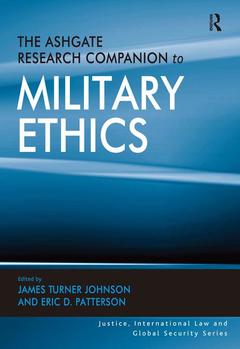The Ashgate Research Companion to Military Ethics Justice, International Law and Global Security Series
Auteurs : Johnson James Turner, Patterson Eric D.

James Turner Johnson is Distinguished Professor in the Department of Religion at Rutgers University-The State University of New Jersey (USA). Johnson is a former Guggenheim, Rockefeller, and National Endowment for the Humanities Fellow, and also served for nine years as founding Co-Editor of the Journal of Military Ethics. He received his Ph.D. with distinction from Princeton University in 1968. Eric D. Patterson is Dean and Professor of the Robertson School of Government at Regent University (Virginia Beach, Virginia) and Research Fellow at Georgetown University's Berkley Center for Religion, Peace, & World Affairs, where he previously served as Associate Director for four years. He has served as a White House Fellow, at the U.S. State Department, and 17 years as an Air National Guard officer.
Date de parution : 01-2015
17.4x24.6 cm
Thèmes de The Ashgate Research Companion to Military Ethics :
Mots-clés :
jus; bellum; post; international; humanitarian; law; war; tradition; armed; conflict; Geneva Convention III; International Humanitarian Law; National Security Strategy; Young Men; Jus Ad Vim; East Timor; Cyber Weapons; Grotius; Hugo Grotius; Jus Ad Bellum; Jus Post Bellum; Professional Military Ethic; Noncombatant Immunity; Non-international Armed Conflict; Military Ethics; Unjust Combatants; Customary International Humanitarian Law; Jus Ad Bellum Decision; Contemporary Armed Conflict; Non-combatant Immunity; War Crimes Tribunals; Anticipatory Self-defense; Human Suffering; Substantive International Criminal Law; Dayr Az Zawr



